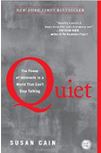I’ve just finished reading Susan Cain’s book Quiet, which is deservedly popular, personally engaging, and full of interesting links to Middle Way Philosophy. It is a book about introversion which points out the way that Western (especially American) culture is especially dominated by extroversion. It also points out the value of introverted traits, and the ways that introverts and extroverts are mutually dependent.

As an introvert myself, I found the book a rich source of greater understanding of the psychological processes I have gone through. She discusses the need to recognise how one is conditioned as introvert (which can be related to genetically high levels of reactivity), and the centrality of that acceptance. She points out, as I have always thought, that introversion has nothing to do with sociability in general, only with a preference for fewer deeper relationships rather than many shallow ones, and with a tendency to be fatigued by over-stimulation. However, she also explains the degree of flexibility that can attend introverted traits, and that it is quite possible to develop the capacity for extroverted behaviour in specific contexts, and to sustain that greater range, provided that one remembers the more basic need to recharge in quiet. This fits my own experience: after a little practice I have no trouble with lecturing to large audiences, for example, though public speaking is a classic stumbling-block for many introverts. Quiet is a heartening book to read if you are an introvert, and I would recommend it.
Cain’s deliberately broad definition of ‘introvert’ is bound to cause trouble with the pedantically inclined. However, she makes it clear that she includes within introversion traits that psychologists have also called conscientiousness, sensitivity, and openness to experience. She recognises how much introverts and extroverts vary, of course, but nevertheless there are justifiable generalisations to make, which are also a matter of degree. These traits often do correlate, but obviously not always: one could be a sensitive and conscientious extrovert or a dogmatic introvert. The generalisations are rough, but not so rough as to be uninformative, provided one is aware of their limitations.
Beyond my personal engagement with this book and an interest in personality psychology in its own terms, however, I also found this book exciting in relation to the questions it raised for me as to how introversion and extroversion as traits may correlate with other tendencies that I have written about. Chief amongst these are dogmatism as opposed to provisionality, the relationship of groups to metaphysical belief and individuality to openness of experience, and the dominance of the left brain over the right. The relationship between these entities is doubtless complex, but well worth disentangling, and does seem to have some crucial correlations. One central aspect of introversion as Cain depicts it is cautious awareness and observation of one’s environment before leaping into action: a trait that relates strongly to the use of the right brain rather than the left. Over-confidence about one’s environment and fixation with goals, however, is very much associated with the dominance of the left brain and the tendency of extroverts to jump unreflectively into communication. The fact that extroverts are much happier in groups seems thus less about liking people as such, than adherence to the certainties offered by the beliefs reinforced by groups – particularly metaphysical beliefs that are so well suited to the purposes of maintaining group identity. The fact that introverts cultivate individuality is what gives them access to greater creativity and insight, and the ability to examine beliefs with greater provisionality.
Surely, then, it is no coincidence that the world so much over-values extroversion, just as it is dominated by left brains. It is the smooth talkers who get through job interviews and earn bonuses, the shallow speechifiers who get elected and run most of our institutions: but these are the very people who are least well-adapted to doing so, because they have too little insight into the world around them, and are more likely to work on the basis of maladapted fixed group beliefs. It is only when introverts get lucky in an extroverted world that we get any recognition – say as scientists, writers or artists. In some ways these may be the unacknowledged legislators of the universe: but only when the extroverts bother to step aside even slightly to let them have a little influence.
Plato, who thought that the world should be run by philosophers, was right in a sense: not because of the rationality of philosophers specifically, though, but because of the dominant psychology of the thoughtful types he regarded as philosophers in his time. It is not just philosopher kings we need, but artist kings and contemplator kings: it is awareness of conditions that we need most, whether mediated by thought or feeling, sense or intuition. Why is academia so bankrupt of creativity? Because extroverts can network better and get most of the academic posts and grants. Why do we have a financial crisis? Because the financial system is overwhelmingly dominated by risk-taking extroverts. Why is life so difficult for introverted teachers and thus for introverted students? Not because introverted teachers can’t teach, but because the idea of successful teaching is so much cast in extrovert terms, and educational managers tend to impose it in those terms.
These problems are not going to go away any time soon, but the condition for them doing so is (a) the introverts having the confidence in their own value to come forward in the way Cain recommends, (b) the extroverts recognising their limitations and altering society in ways that limit their dominance. Just as the left brain needs the right to alert it to conditions, society needs introverts. Introverts have nothing to lose but the chains in which the extroverts have bound them.
Editors note: This is a re-post from Robert Ellis’s blog, Middle Way Philosophy. You can see the original here and Robert Ellis’s full blog here. Susan Cain’s book, Quiet, the Power of Introverts in a World That Can’t Stop Talking is available at booksellers worldwide including amazon (here) and amazon.uk. You can see Cain’s website here and her recent talk at TED here.











